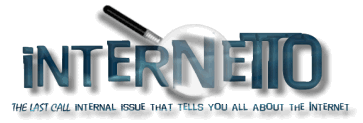 INDEX :
INDEX :
|
|
 INDEX :
INDEX :
|
|
Internetto is an internal Issue, edited and composed by THE LAST CALL Net
staff to inform our clients about our News and Events, and to give the
possibility to the people that doesn’t know anything about the Internet
to get some serious informations about it. We also have tips and tricks
for the “almost experts” plus links and News and … see inside !
The only “complain” we may receive is :<<Why can’t I have a copy
to bring home ?>>.
We regret but at now we don’t have
the power to provide more than a few copies so we preferred to have a copy
on line (this) on THE LAST CALL Web Site and a copy inside of THE LAST
CALL (on the readers table).
THE WEB IS LIKE A SMALL TOWN
Even though the Internet is a global network, in many ways, it resembles a small town. Imagine a system of roadways that can cut hours off your travel time. Or 24-hour coffee shops with people eager to gab anytime you want. The Internet equivalent are chat rooms.
Let's say you want to send or receive your mail. The Internet has electronic post offices. There are libraries you can use any time of the day or night, with millions of books and unlimited browsing. With the explosive growth of the World Wide Web, you can shop, “order a pizza“, preview a movie, and listen to radio stations from around the World, for example from our THE LAST CALL web site you can reserve a table.
All of these represent different ways of using the Internet. In the real world you can travel to different places using the same network of roads and highways (telephone network), but using different modes of transportation. Getting around on the Internet works pretty much the same way. On the network of roads in the real world, you might use a car for one purpose and a truck for something else. In order to understand the Internet, it is helpful to realize that there are many different kinds of communication going on at the same time. On the Internet, you use different software programs to accomplish different tasks.
For instance, many commercial Internet programs, such as Netscape Communicator,
contain more than one kind of software. Communicator has a web browser,
called Netscape Navigator, an e-mail program and a newsreader. (In later
articles, we will explain what each of these programs do.) You can also
use more specialized and sophisticated software, such as Eudora, a stand-alone
e-mail program. You can combine many different software packages together
into a system that works for you.
The Internet is a global network of computers linked via telephone cables and optic fibres. Some of these computers are constantly connected to the Internet while some others just drop for a visit. Every computers permanently connected to the net stores (or hosts) a bunch of informations which can be accessed by other users.
To get to that information, you need to link your computer to another one
which is already “on line” or part of the Internet. You can link to 2 computer
together with a cable, which is common in an office, or through a telephone
line, which is what happens when you connect t o THE FIJI INTERNET SERVICE
in Suva (our Fiji Internet service provider os ISP) from home. While you
are connected to that other computer, you become one of the millions of
computers which make up the Internet.
WHAT IS AND INTERNET SERVICE
PROVIDER (ISP) ?
An Internet Service Provider (or ISP) is a company with a “fast” computer which is permanently connected through a big pipe. This company then sells you the right to connect to its computer and use part of ita pipeline to the World Wide Web (or WWW). Once you have an Internet connection you can access all the informations of the millions of computer connected to the “net”.
To get your computer to “talk” with the ISP’s one, you need a modem, which helps to translate you computer’s digital signals into the telephone line’s analogue signals, and you need software (Web Browsers or E-mail applications) which will help your computer speak to other computers. Some of the software you need may have come with your computer. Other pieces of software should be given to you by your ISP or directly from the net.